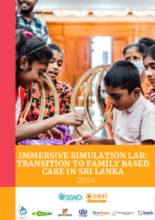On March 20, 2024, an immersive simulation lab event took place in Sri Lanka. Child protection allies from the Western Province of Sri Lanka gathered for a hands-on experience aimed at transitioning from a system reliant on child care institutions to one focused on promoting family-based care and strengthening family initiatives.
In Sri Lanka, the concepts of deinstitutionalization (DI) and alternative care (AC) have become a driving force in the broader efforts to reform the child welfare system. Recognizing the limitations of orphanages and institutional care, the Sri Lankan Government has been working towards transitioning to family-based or community-based care models.
This shift aligns with the country's commitment to upholding the rights and well-being of children, as outlined by the UN Convention on the Rights of the Child and the Alternative Care Policy. Initiatives such as promoting foster care, strengthening kinship care networks, and facilitating adoption processes have been integral to this endeavor. By prioritizing nurturing environments and family connections, the Sri Lankan Government aims to provide better outcomes for children in need of care, ensuring they have the opportunity to thrive regardless of their family circumstances.
The Immersive Simulation Lab on transitioning to Family Based Care and establishing an Alternative Care System aligns with the goals of the Sri Lankan Government.

